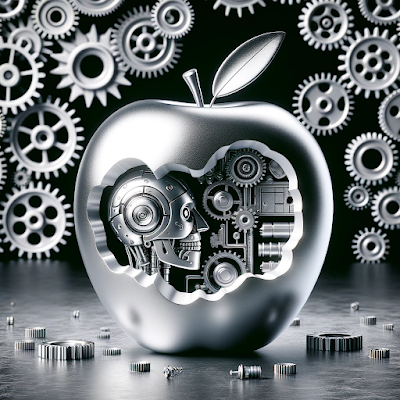Amazon Eyes Additional Multi-Billion Dollar Investment in Anthropic
Amazon.com is considering a second multi-billion dollar investment in AI startup Anthropic, maker of Claude.ai, according to a report by Reuters. This follows Amazon’s previous $4 billion investment in Anthropic, seen as a competitor to OpenAI, in 2023. Anthropic relies on Amazon’s cloud infrastructure but has shown a preference for Nvidia-designed chips over Amazon’s own server technology. The growth of Anthropic, co-founded by former OpenAI executives, has attracted significant interest, with Google-parent Alphabet also committing up to $2 billion in funding. This investment is part of Amazon’s broader AI strategy to offer early access to advanced AI capabilities to its cloud customers.
Key Takeaways:
- Amazon is contemplating a new multi-billion dollar investment in AI company Anthropic, following an initial $4 billion investment.
- Anthropic uses Amazon’s cloud but prefers Nvidia chips, indicating differing technology preferences.
- Previous funding includes a major investment from Alphabet, totaling up to $2 billion.
BYOAI: How Workers Are Adopting AI to Tackle Rising Workloads Amidst Policy Gaps
A new report from Wrike reveals that American workers are managing an increased workload, up 31% from last year, by adopting generative AI tools like ChatGPT, Co-Pilot, and Claude to boost productivity. However, only 31% of companies currently have AI guidelines in place, creating a disconnect between workers’ adoption of AI and company policies. Experts recommend that organizations establish comprehensive AI policies, including ethical training, to bridge this gap and support responsible AI usage. As companies catch up, generative AI is increasingly seen as essential for streamlining tasks and filling gaps amid rising workloads.
Key Takeaways:
- U.S. workers report a 31% increase in workload, leading many to adopt generative AI tools for efficiency.
- Companies lag behind, with only 31% having AI policies in place.
- Experts call for structured AI policies and ethical training to responsibly integrate AI into workplaces.
(Source: VentureBeat)
How OpenAI’s Voice and Search Upgrades Pave the Way for Advanced AI Agents
OpenAI has recently launched updates to its platform, including a Realtime API that supports voice features and a ChatGPT-powered search function, laying the groundwork for AI agents—advanced digital assistants capable of handling complex tasks. Two significant challenges remain: enhancing AI’s reasoning abilities and enabling seamless tool use. OpenAI’s latest model includes a “chain of thought” feature to improve reasoning, though experts note it doesn’t yet achieve true human reasoning. OpenAI aims to expand these AI capabilities across fields like law, economics, and accounting, foreseeing transformative applications.
Key Takeaways:
- OpenAI’s recent updates aim to support AI agents that could manage complex tasks using voice features and search capabilities.
- Challenges remain in developing reasoning and external tool-use abilities for AI agents.
- OpenAI plans to adapt these capabilities for fields like law, economics, and accounting to broaden its applications.
(Source: MIT Technology Review)
CanLII Sues AI Chatbot Caseway Over Copyright Concerns in Legal Data Use
The Canadian Legal Information Institute (CanLII) has filed a lawsuit against Caseway AI, a legal research chatbot, claiming copyright infringement and terms-of-service violations due to unauthorized scraping of 3.5 million legal records. CanLII argues that its legal database enhancements, such as hyperlinks and error corrections, are copyrighted. In response, Caseway claims that it did not harm CanLII’s services and that both organizations share a mission to make legal information accessible. This case is part of a larger debate about AI’s use of public data and copyright in the age of generative AI.
Key Takeaways:
- CanLII has sued Caseway AI for scraping its legal database, alleging copyright infringement.
- Caseway argues that it is working toward a shared goal of making legal data accessible.
- This case highlights ongoing copyright and data-use debates related to generative AI.
(Source: CBC News)
Parti Québécois' Push for AI Over Immigration Sparks Debate on Workforce Solutions
In response to Quebec’s labor shortages, the Parti Québécois (PQ) has proposed automation and AI as alternatives to immigrant labor. The plan targets investments in manufacturing, retail, and agriculture, taking inspiration from automation trends in countries like South Korea and Japan. Experts, however, caution that automating critical roles in fields like healthcare and education presents unique challenges and cannot fully replace the need for immigrants. Business representatives also highlight high costs, taxes, and regulatory hurdles as obstacles for small businesses aiming to adopt AI solutions. While automation could play a role in Quebec’s economy, experts conclude that it cannot be a standalone solution to the province’s labor challenges.
Key Takeaways:
- The Parti Québécois proposes automation to address labor shortages, reducing reliance on immigration.
- Experts say essential jobs in healthcare and education are difficult to automate effectively.
- High costs and regulatory hurdles make automation challenging for smaller businesses, indicating a need for balanced workforce solutions.
(Source: CTV News)
Author: Malik Datardina, CPA, CA, CISA. Malik works at Auvenir as a GRC Strategist who is working to transform the engagement experience for accounting firms and their clients. The opinions expressed here do not necessarily represent UWCISA, UW, Auvenir (or its affiliates), CPA Canada or anyone else. This post was written with the assistance of an AI language model. The model provided suggestions and completions to help me write, but the final content and opinions are my own.













